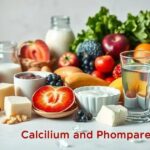Understanding Vitamin Deficiency
Many people experience feelings of being overwhelmed and exhausted, often attributing these sensations to stress or lack of sleep. However, vitamin deficiency can often be a hidden factor contributing to these feelings. Without sufficient vitamins, our bodies struggle to perform essential functions, leaving us feeling drained and unable to cope with daily pressures.
This issue is more common than we might think, affecting individuals across different age groups and lifestyles. Despite living in a world abundant with food resources, the lack of a balanced diet can lead to significant vitamin deficits, impacting energy levels, mental clarity, and overall well-being.
Common Symptoms of Vitamin Deficiency
The Calm Reset — 7 Days to Feel Steady, Kind & In Control Again - Only $2.99
Gentle guidance trusted by our community.
Vitamin deficiency doesn’t always manifest in obvious ways. Often, the symptoms are subtle and can be mistaken for other conditions. Common signs include chronic fatigue, mood swings, and even depressive symptoms. These are your body’s signals that something is amiss and needs addressing.
Ignoring these symptoms can lead to more severe health issues over time. For instance, a deficiency in B vitamins can significantly affect your brain function and mood regulation. It’s crucial to listen to your body and take note of persistent signs that all might not be well.
Addressing Vitamin Deficiency
Tackling vitamin deficiency starts with your diet. Incorporating a variety of fruits, vegetables, lean proteins, and whole grains into your daily meals can help restore essential nutrients. Supplementation may also be necessary, especially if you have dietary restrictions that limit certain food groups.
Consulting with a healthcare provider can be beneficial. They can conduct tests to determine specific deficiencies and recommend personalized dietary adjustments or supplements to help restore your optimal health.
The Role of Vitamin Supplements
While ideally, you would get all your nutrients from food, this isn’t always feasible. This is where high-quality vitamin supplements come into play. Products designed specifically for women, like those available at InneHer USA, can target deficiencies and support your body’s specific needs at different life stages.
Taking supplements should complement a healthy diet, not replace it. They are best used as part of a holistic approach to achieve balance and vitality, enhancing the nutrients you gain from food.
Linking Vitamin Deficiency to Hair Loss
Did you know that vitamin deficiency can contribute to hair loss? Lack of iron, vitamin D, and other essential nutrients can weaken hair structure and promote shedding. Addressing these deficiencies through diet and supplementation can help improve hair health and reduce hair loss.
If you’re struggling with hair loss, consider exploring our resources on hair health. By understanding the root cause, you can make informed choices about your diet and lifestyle to combat hair issues effectively.
Watch Our Video for More Insights
For a more in-depth analysis and personal stories related to vitamin deficiency, check out our latest video. We cover how these hidden deficiencies could be the cause of your overwhelming feelings and provide practical tips on overcoming them.
FAQ
How can I tell if I have a vitamin deficiency?
Many experience vitamin deficiencies without realizing it. Symptoms can be easily mistaken for everyday fatigue or stress. Look out for persistent tiredness, hair loss, or mood changes, and consider consulting a healthcare provider for a definitive diagnosis.
Which vitamins are most commonly deficient?
Common deficiencies include vitamins D, B12, and iron. These nutrients are crucial for energy, immune function, and overall health. Ensuring a balanced diet and considering supplements can help address these common deficiencies.
Can supplements fully replace a healthy diet?
Supplements should not replace a healthy diet. They are designed to complement your nutritional intake by addressing gaps due to dietary restrictions or increased nutritional needs at certain life stages.
What are some natural sources of vitamins?
Natural sources include a variety of colorful fruits and vegetables, lean meats, fish, nuts, seeds, and whole grains. These foods provide a rich array of essential vitamins and minerals necessary for maintaining overall health.
How often should I take vitamin supplements?
The frequency depends on the type of supplement and individual health needs. Always follow the label instructions and consult your healthcare provider to determine an appropriate regimen based on your unique nutritional requirements.
Watch the Video:
The Calm Reset — 7 Days to Feel Steady, Kind & In Control Again - Only $2.99
Gentle guidance trusted by our community.






